人教新目标(Go for it)版七年级下Unit 4 Don't eat in class. Section A Grammar Focus-3c课件(26张PPT)
文档属性
| 名称 | 人教新目标(Go for it)版七年级下Unit 4 Don't eat in class. Section A Grammar Focus-3c课件(26张PPT) |
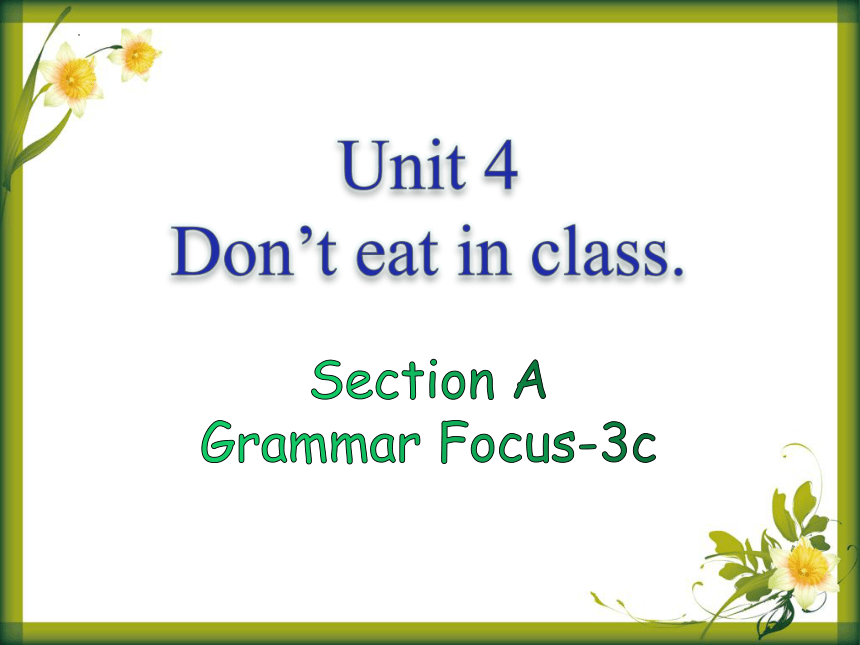
|
|
| 格式 | pptx | ||
| 文件大小 | 1.2MB | ||
| 资源类型 | 教案 | ||
| 版本资源 | 人教新目标(Go for it)版 | ||
| 科目 | 英语 | ||
| 更新时间 | 2022-03-20 00:00:00 | ||
图片预览

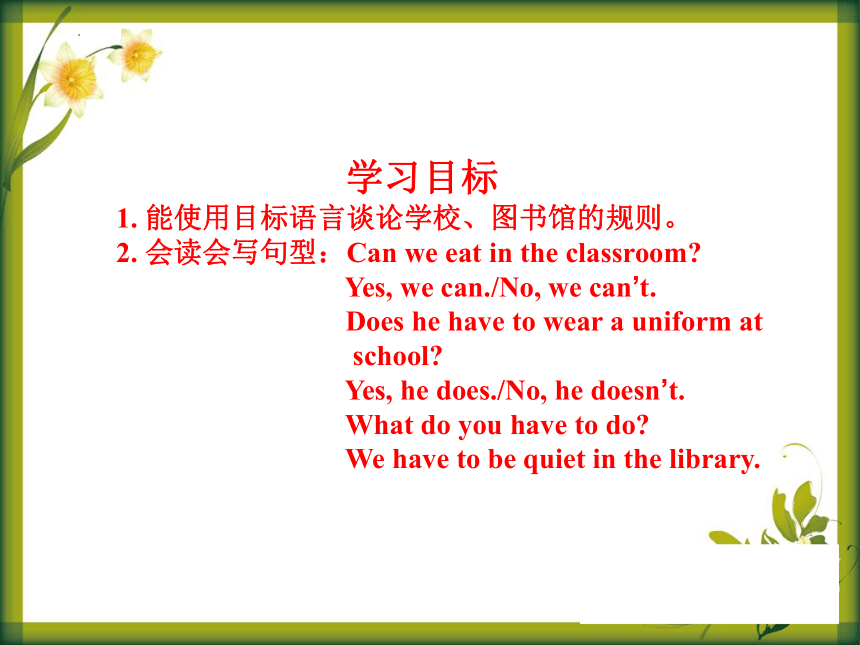
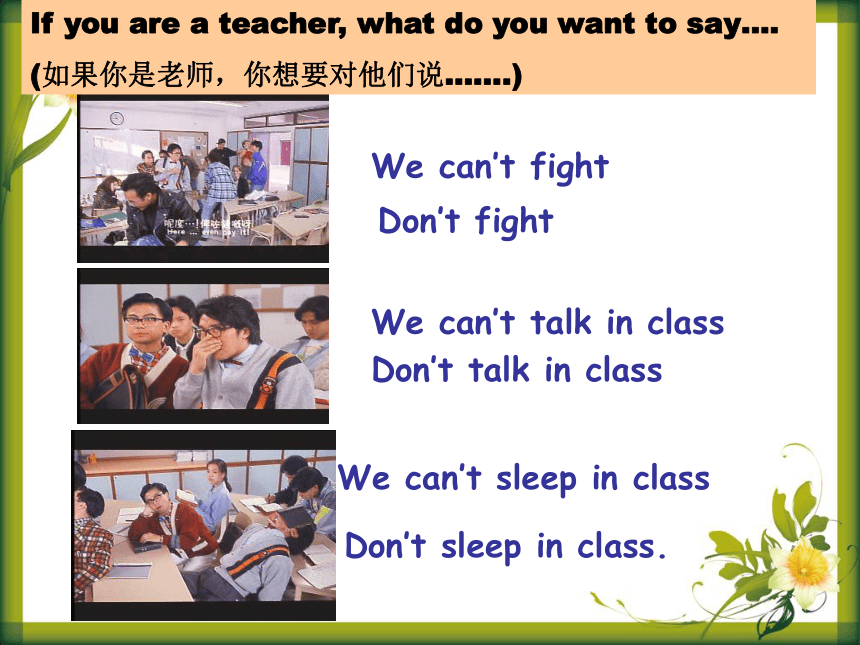


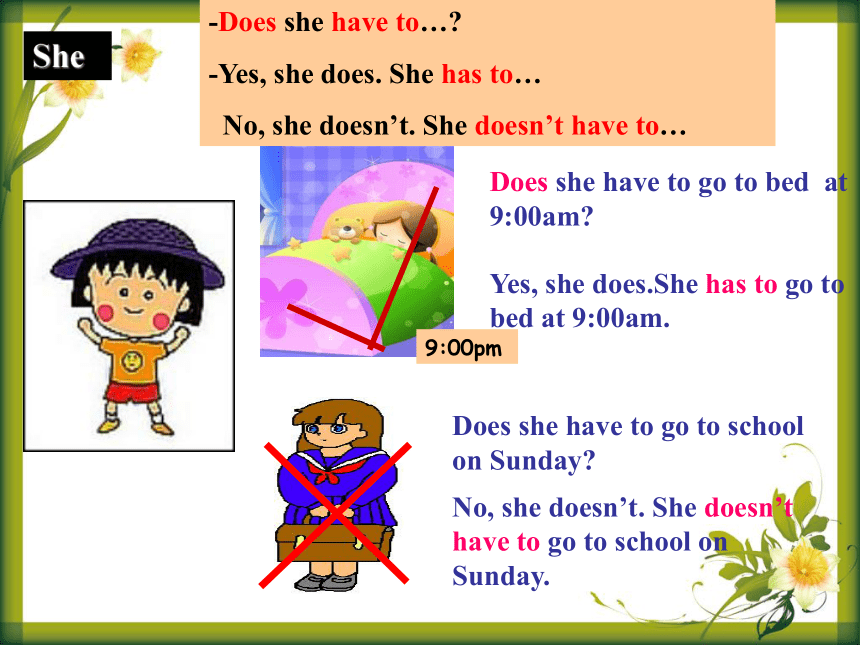
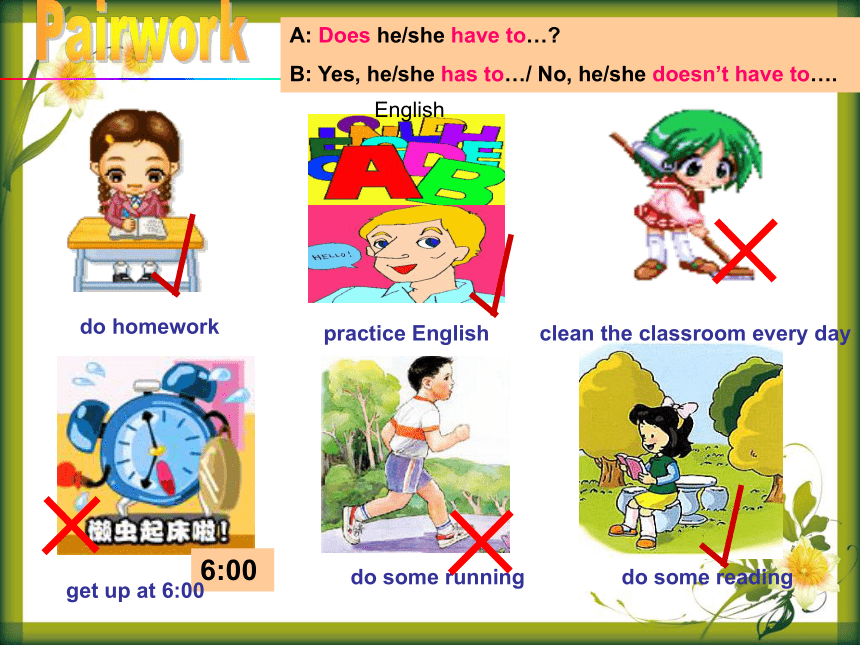
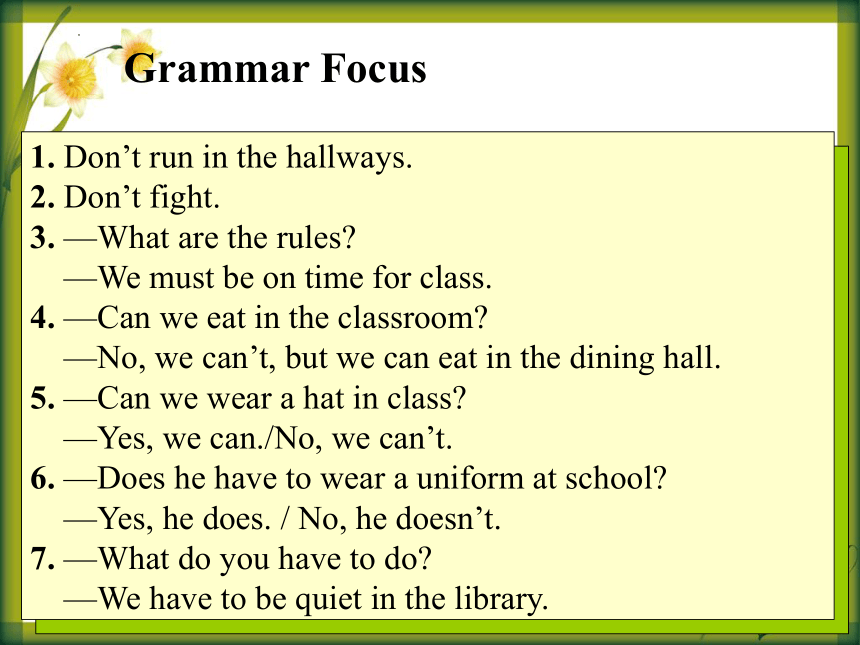
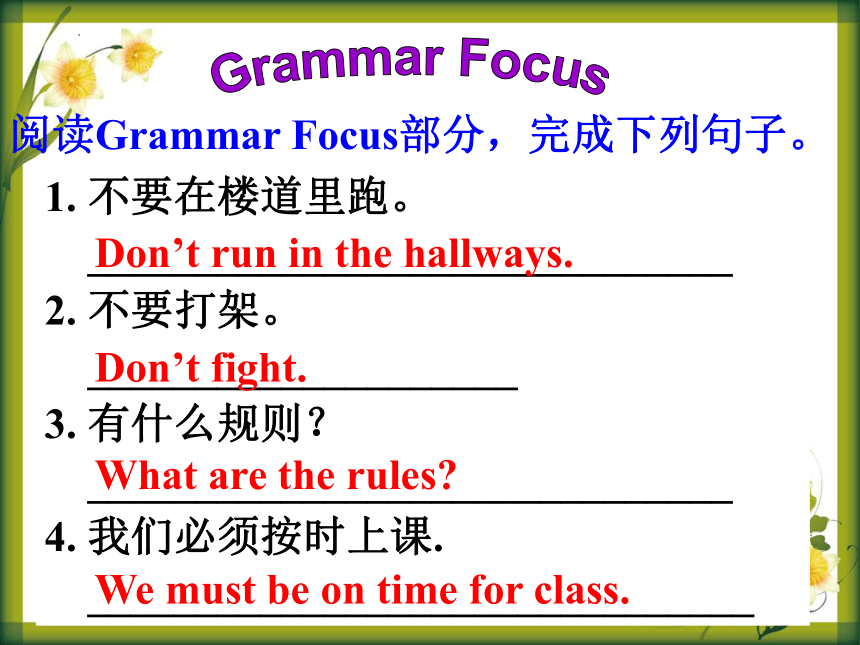
文档简介
(共26张PPT)
Unit 4
Don’t eat in class.
Section A
Grammar Focus-3c
学习目标
1. 能使用目标语言谈论学校、图书馆的规则。
2. 会读会写句型:Can we eat in the classroom
Yes, we can./No, we can’t.
Does he have to wear a uniform at
school
Yes, he does./No, he doesn’t.
What do you have to do
We have to be quiet in the library.
We can’t fight
Don’t fight
We can’t talk in class
Don’t talk in class
We can’t sleep in class
Don’t sleep in class.
If you are a teacher, what do you want to say….
(如果你是老师,你想要对他们说…….)
School Rules
Don’t…
run in the hallways
fight
arrive late for school
talk in the classroom
eat in the classroom
listen to music in the classroom
8:10
Revision
He
-Does he have to…
-Yes, he does. He has to…
No, he doesn’t. He doesn’t have to…
Does he have to clean his room on weekend
Does he have to play the guitar every day
Yes, he does. He has to clean his room on weekend.
No, he doesn’t. He doesn’t have to play the guitar every day.
She
Does she have to go to school on Sunday
No, she doesn’t. She doesn’t have to go to school on Sunday.
9:00pm
Does she have to go to bed at 9:00am
Yes, she does.She has to go to bed at 9:00am.
-Does she have to…
-Yes, she does. She has to…
No, she doesn’t. She doesn’t have to…
English
Pairwork
do homework
practice English
clean the classroom every day
do some running
do some reading
A: Does he/she have to…
B: Yes, he/she has to…/ No, he/she doesn’t have to….
6:00
get up at 6:00
Grammar Focus
1. Don’t run in the hallways.
2. Don’t fight.
3. —What are the rules
—We must be on time for class.
4. —Can we eat in the classroom
—No, we can’t, but we can eat in the dining hall.
5. —Can we wear a hat in class
—Yes, we can./No, we can’t.
6. —Does he have to wear a uniform at school
—Yes, he does. / No, he doesn’t.
7. —What do you have to do
—We have to be quiet in the library.
1. 不要在楼道里跑。
______________________________
2. 不要打架。
____________________
3. 有什么规则?
______________________________
4. 我们必须按时上课.
_______________________________
阅读Grammar Focus部分,完成下列句子。
Don’t fight.
Don’t run in the hallways.
What are the rules
We must be on time for class.
Grammar Focus
5. 我们可以在教室里吃东西吗?
_____________________________
6. 不能。但我们可以在餐厅里吃东西。
________________________________
________________________________
7. 我们可以在上课的时候带帽子吗?
_____________________________
Can we wear a hat in class
No, we can’t, but we can eat in the dining hall.
Can we eat in the classroom
8. 他在学校里必须穿校服吗?
__________________________________
9. 是的,必须。/ 不,不必。
_______________________________
10. 你们必须做什么?
_______________________________
11. 在图书馆里我们必须保持安静。
_________________________________
Yes, he does. / No, he doesn’t.
Does he have to wear a uniform at school
What do you have to do
We have to be quiet in the library.
祈使句(Imperative Sentences)
1. 概念
(1)祈使句是指用来表示请求、命令、叮嘱、建议等的句子。
祈使句没有主语,谓语动词用原形,句末使用感叹号或者句号。
(2)如果祈使句表示客气地请求,一般要
加上please。
Eg. Please read after me.
= Read after me, please.
(请求)
您的标题
2. 祈使句的形式
(1)let开头的祈使句
肯定句: Let’s + v.(原形) + 其他.
否定形式:
1° Don’t + let + 第三人称代词 + v.(原形).
2° Let’s + not + v.(原形).
eg.不要让他们进来。
Don’t let them come in.
eg. 咱们别那样做了。
Let’s not do that again.
(2)非let开头的祈使句:
肯定句
Do 型
: v.原形(+宾语)+其他成份.
eg:Listen to me, please.请听我说。
Be 型:
Be+表语(名词或形容词)+其他成份.
eg:Be quiet, please. 请安静。
否定句
1° Don’t + 行为动词 + 其他.
eg: Don’t play computer games. 不要玩电脑游戏。
2°Don’t + be + 其他.
eg: Don’t be late again. 不要再迟到。
3° No + n./v.-ing.(表示禁止、不准)
eg: No photos. 不许拍照。
No swimming.不许游泳。
Library Rules
1. Don’t talk.
2. _______________________________________
3. _______________________________________
4. _______________________________________
3a. Write the rules for the school library.
Don’t eat in the library.
Don’t listen to music in the library.
Don’t take pictures/photos in the library.
3b. Use the words to make questions about the rules. Then write answers according to your school.
e.g.
Be quiet
Q: Does she have to be quiet in the library
(she/have to/ in the library)
A: Yes, she does.
No.1 Eat
Q: ______________________________________
(he/have to/in the dining hall)
A: _______________________________________
No.2 Listen to music
Q: ______________________________________
(we/can/ in the hallways)
A: _______________________________________
No.3 Wear a hat
Q: ______________________________________
(we/can/in the classroom)
A: _______________________________________
Does he have to eat in the dining hall
Yes, he does.
Can we listen to music in the hallways
No, we can’t.
No, we can’t.
Can we wear a hat in the classroom
3c. Make up five cool rules for your dream school. Share your rules with the class. Your classmates vote for the Coolest School!
1. We don’t have to do homework any more.
2. We don’t have to come to school every day.
3. We don’t have to clean the classroom.
4. We can walk out of the class anytime we want.
5. We can study and have class outside in a garden with flowers, grass and trees.
At my dream school, we don’t have to come to school every day. We can eat in the classroom.
We can listen to music in class.
We don’t have to do homework.
We don’t have to wear school uniforms at school.
Report
Great! Jim’s school is the coolest.
1. can1 modal v.能;能够 (表示许可)
—Can I sit here 我可以坐这儿吗?
—No, you can’t.不, 你不能。
can2能;会 (表示能力)
—Can you play basketball 你会打篮球吗?
—Yes, I can.是的, 我会。
2. 祈使句
(1) 该句经常用来表示请求、命令、叮嘱、建议等,谓语动词用原形,句子没有主语,句子使用感叹号或者句号 。
(2) 肯定句:be/v.原 + 其他
Listen to me, please.请听我说。
(3) 否定句:Don’t + be/v.原 + 其他
Don’t eat in the classroom.
不要在教室里吃东西。
(3) Sentences pattern
a. Be型:Be+P
Be quick!快一点!
b. V型:v.+ O + 其他(vi.则无宾语)
Close the door, please.请关门!
Run!快跑!
c. L型:Let +O + v.原 + 其他
let后面的宾语是第一人称的时候,否定形式为在宾语后面加not;第三人称的时候,否定形式则在let前加助动词don’t。
Let’s not do that again.咱们别那样做了。
Don’t let them come in.不要让他们进来。
3. must & have to
(1) must:表示说话人的主观看法,即主观上的必要性,还用来表示命令和愿望。
(2) have to表示客观需要,即周围的环境、习惯等要求某人不得不或必须去做某事。
You must finish your homework.
你必须做完你的作业。
My sister is ill. I have to look after her.
我妹妹病了,我必须在家照看她。
(3) must只用于现在时,在表示过去、将来和完成时,用have to的相应形式来代替must。
I had to get up early yesterday.
我昨天必须早起。
(4) have to的否定形式为not have to,相当于needn’t“不必”;must的否定形式为must not(mustn’t abbr.)“不能;千万不能”。
You don’t have to go there now.
你现在不必去那儿。
1. He has to eat breakfast quickly. (改为一般疑问句)
__________________________________
2. Play volleyball after class. (改为否定句)
________________________________
句型转换
Does he have to eat breakfast quickly
Don’t play volleyball after class.
exercise
3. We can wear sports shoes in class. (改为一般疑问) ______________________________
4. Don’t arrive late for class. (改为同义句)
_______________________________
5. Eric has to do his homework before six. (对划线部分提问)
___________________________________
Can we wear sports shoes in class
We must be on time for class.
What does Eric have to do before six
Unit 4
Don’t eat in class.
Section A
Grammar Focus-3c
学习目标
1. 能使用目标语言谈论学校、图书馆的规则。
2. 会读会写句型:Can we eat in the classroom
Yes, we can./No, we can’t.
Does he have to wear a uniform at
school
Yes, he does./No, he doesn’t.
What do you have to do
We have to be quiet in the library.
We can’t fight
Don’t fight
We can’t talk in class
Don’t talk in class
We can’t sleep in class
Don’t sleep in class.
If you are a teacher, what do you want to say….
(如果你是老师,你想要对他们说…….)
School Rules
Don’t…
run in the hallways
fight
arrive late for school
talk in the classroom
eat in the classroom
listen to music in the classroom
8:10
Revision
He
-Does he have to…
-Yes, he does. He has to…
No, he doesn’t. He doesn’t have to…
Does he have to clean his room on weekend
Does he have to play the guitar every day
Yes, he does. He has to clean his room on weekend.
No, he doesn’t. He doesn’t have to play the guitar every day.
She
Does she have to go to school on Sunday
No, she doesn’t. She doesn’t have to go to school on Sunday.
9:00pm
Does she have to go to bed at 9:00am
Yes, she does.She has to go to bed at 9:00am.
-Does she have to…
-Yes, she does. She has to…
No, she doesn’t. She doesn’t have to…
English
Pairwork
do homework
practice English
clean the classroom every day
do some running
do some reading
A: Does he/she have to…
B: Yes, he/she has to…/ No, he/she doesn’t have to….
6:00
get up at 6:00
Grammar Focus
1. Don’t run in the hallways.
2. Don’t fight.
3. —What are the rules
—We must be on time for class.
4. —Can we eat in the classroom
—No, we can’t, but we can eat in the dining hall.
5. —Can we wear a hat in class
—Yes, we can./No, we can’t.
6. —Does he have to wear a uniform at school
—Yes, he does. / No, he doesn’t.
7. —What do you have to do
—We have to be quiet in the library.
1. 不要在楼道里跑。
______________________________
2. 不要打架。
____________________
3. 有什么规则?
______________________________
4. 我们必须按时上课.
_______________________________
阅读Grammar Focus部分,完成下列句子。
Don’t fight.
Don’t run in the hallways.
What are the rules
We must be on time for class.
Grammar Focus
5. 我们可以在教室里吃东西吗?
_____________________________
6. 不能。但我们可以在餐厅里吃东西。
________________________________
________________________________
7. 我们可以在上课的时候带帽子吗?
_____________________________
Can we wear a hat in class
No, we can’t, but we can eat in the dining hall.
Can we eat in the classroom
8. 他在学校里必须穿校服吗?
__________________________________
9. 是的,必须。/ 不,不必。
_______________________________
10. 你们必须做什么?
_______________________________
11. 在图书馆里我们必须保持安静。
_________________________________
Yes, he does. / No, he doesn’t.
Does he have to wear a uniform at school
What do you have to do
We have to be quiet in the library.
祈使句(Imperative Sentences)
1. 概念
(1)祈使句是指用来表示请求、命令、叮嘱、建议等的句子。
祈使句没有主语,谓语动词用原形,句末使用感叹号或者句号。
(2)如果祈使句表示客气地请求,一般要
加上please。
Eg. Please read after me.
= Read after me, please.
(请求)
您的标题
2. 祈使句的形式
(1)let开头的祈使句
肯定句: Let’s + v.(原形) + 其他.
否定形式:
1° Don’t + let + 第三人称代词 + v.(原形).
2° Let’s + not + v.(原形).
eg.不要让他们进来。
Don’t let them come in.
eg. 咱们别那样做了。
Let’s not do that again.
(2)非let开头的祈使句:
肯定句
Do 型
: v.原形(+宾语)+其他成份.
eg:Listen to me, please.请听我说。
Be 型:
Be+表语(名词或形容词)+其他成份.
eg:Be quiet, please. 请安静。
否定句
1° Don’t + 行为动词 + 其他.
eg: Don’t play computer games. 不要玩电脑游戏。
2°Don’t + be + 其他.
eg: Don’t be late again. 不要再迟到。
3° No + n./v.-ing.(表示禁止、不准)
eg: No photos. 不许拍照。
No swimming.不许游泳。
Library Rules
1. Don’t talk.
2. _______________________________________
3. _______________________________________
4. _______________________________________
3a. Write the rules for the school library.
Don’t eat in the library.
Don’t listen to music in the library.
Don’t take pictures/photos in the library.
3b. Use the words to make questions about the rules. Then write answers according to your school.
e.g.
Be quiet
Q: Does she have to be quiet in the library
(she/have to/ in the library)
A: Yes, she does.
No.1 Eat
Q: ______________________________________
(he/have to/in the dining hall)
A: _______________________________________
No.2 Listen to music
Q: ______________________________________
(we/can/ in the hallways)
A: _______________________________________
No.3 Wear a hat
Q: ______________________________________
(we/can/in the classroom)
A: _______________________________________
Does he have to eat in the dining hall
Yes, he does.
Can we listen to music in the hallways
No, we can’t.
No, we can’t.
Can we wear a hat in the classroom
3c. Make up five cool rules for your dream school. Share your rules with the class. Your classmates vote for the Coolest School!
1. We don’t have to do homework any more.
2. We don’t have to come to school every day.
3. We don’t have to clean the classroom.
4. We can walk out of the class anytime we want.
5. We can study and have class outside in a garden with flowers, grass and trees.
At my dream school, we don’t have to come to school every day. We can eat in the classroom.
We can listen to music in class.
We don’t have to do homework.
We don’t have to wear school uniforms at school.
Report
Great! Jim’s school is the coolest.
1. can1 modal v.能;能够 (表示许可)
—Can I sit here 我可以坐这儿吗?
—No, you can’t.不, 你不能。
can2能;会 (表示能力)
—Can you play basketball 你会打篮球吗?
—Yes, I can.是的, 我会。
2. 祈使句
(1) 该句经常用来表示请求、命令、叮嘱、建议等,谓语动词用原形,句子没有主语,句子使用感叹号或者句号 。
(2) 肯定句:be/v.原 + 其他
Listen to me, please.请听我说。
(3) 否定句:Don’t + be/v.原 + 其他
Don’t eat in the classroom.
不要在教室里吃东西。
(3) Sentences pattern
a. Be型:Be+P
Be quick!快一点!
b. V型:v.+ O + 其他(vi.则无宾语)
Close the door, please.请关门!
Run!快跑!
c. L型:Let +O + v.原 + 其他
let后面的宾语是第一人称的时候,否定形式为在宾语后面加not;第三人称的时候,否定形式则在let前加助动词don’t。
Let’s not do that again.咱们别那样做了。
Don’t let them come in.不要让他们进来。
3. must & have to
(1) must:表示说话人的主观看法,即主观上的必要性,还用来表示命令和愿望。
(2) have to表示客观需要,即周围的环境、习惯等要求某人不得不或必须去做某事。
You must finish your homework.
你必须做完你的作业。
My sister is ill. I have to look after her.
我妹妹病了,我必须在家照看她。
(3) must只用于现在时,在表示过去、将来和完成时,用have to的相应形式来代替must。
I had to get up early yesterday.
我昨天必须早起。
(4) have to的否定形式为not have to,相当于needn’t“不必”;must的否定形式为must not(mustn’t abbr.)“不能;千万不能”。
You don’t have to go there now.
你现在不必去那儿。
1. He has to eat breakfast quickly. (改为一般疑问句)
__________________________________
2. Play volleyball after class. (改为否定句)
________________________________
句型转换
Does he have to eat breakfast quickly
Don’t play volleyball after class.
exercise
3. We can wear sports shoes in class. (改为一般疑问) ______________________________
4. Don’t arrive late for class. (改为同义句)
_______________________________
5. Eric has to do his homework before six. (对划线部分提问)
___________________________________
Can we wear sports shoes in class
We must be on time for class.
What does Eric have to do before six
同课章节目录
- Unit 1 Can you play the guitar?
- Section A
- Section B
- Unit 2 What time do you go to school?
- Section A
- Section B
- Unit 3 How do you get to school?
- Section A
- Section B
- Unit 4 Don't eat in class.
- Section A
- Section B
- Unit 5 Why do you like pandas?
- Section A
- Section B
- Unit 6 I'm watching TV.
- Section A
- Section B
- Review of Units 1-6
- Unit 7 It's raining!
- Section A
- Section B
- Unit 8 Is there a post office near here?
- Section A
- Section B
- Unit 9 What does he look like?
- Section A
- Section B
- Unit 10 I'd like some noodles.
- Section A
- Section B
- Unit 11 How was your school trip?
- Section A
- Section B
- Unit 12 What did you do last weekend?
- Section A
- Section B
